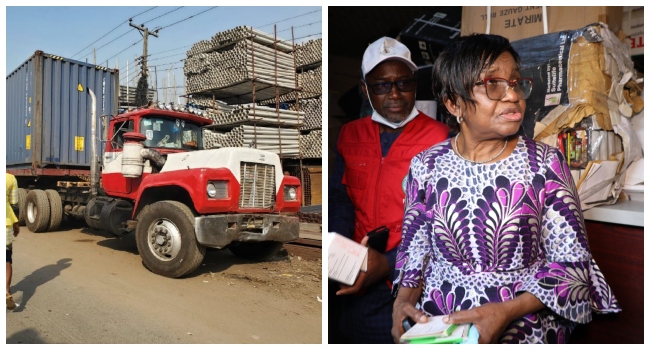The National Agency for Food and Drug Administration and Control (NAFDAC) has defended its recent nationwide crackdown on counterfeit drugs, dismissing claims that it is anti-business. The agency’s operation involved raiding markets and shops where fake and substandard drugs were found.
The enforcement action has sparked criticism from some quarters, with accusations that NAFDAC unfairly targeted non-pharmaceutical sections of certain markets. However, the agency’s Director General, Mojisola Adeyeye, refuted these allegations, emphasizing that the primary goal is to protect public health.
“We are not disrupting trade; we are saving lives. We could not have done this without the NSA. It’s a security risk for our country. What the BBC exposed is heartbreaking—young men rendered useless,” Adeyeye said in a video posted on NAFDAC’s X handle following the latest seizures.
She further stressed that the agency’s actions are in line with its mandate. “What NAFDAC is doing is exactly what NAFDAC is supposed to do—safeguarding public health. There is no political motive behind our actions. Many of these shops are not even registered with the Pharmaceutical Council of Nigeria (PCN), which is responsible for licensing pharmaceutical premises and personnel.”
Speaking at a press conference in Lagos on Saturday, Adeyeye revealed that NAFDAC had sealed over 11,000 shops and arrested 40 individuals as part of the ongoing crackdown on fake and substandard drugs.
She explained that the operation was a year in the making and executed covertly. The agency began its enforcement on February 10, targeting the Idumota Open Drug Market in Lagos, the Ariaria Drug Market in Aba, Abia State, and the Bridge Market in Onitsha, Anambra State. These three markets reportedly distribute over 80% of the nation’s medications, making them critical focal points in the fight against falsified and unregistered drugs.
“We are concluding our operations in Aba as most of the evacuation has been completed. Our next phase is to inspect individual shops to distinguish between those operating legally and those that are not registered,” Adeyeye stated.
“So far, we have shut down over 4,000 shops in Onitsha, 3,027 in Lagos, and another 4,000 in Aba since the operation began. In Onitsha, we have only completed about 20% of the work. A thorough review is necessary because some traders, while legitimate, are not properly registered under the PCN.”
